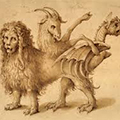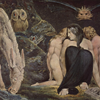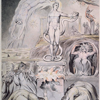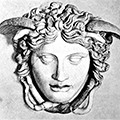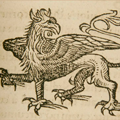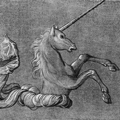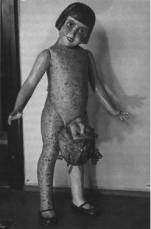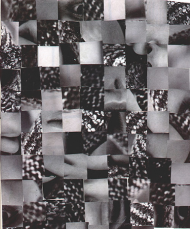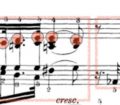Ovidiu Morar [*]
Resumen. Para el análisis de la poesía de Gherasim Luca el presente trabajo se servirá del concepto freudiano, reinventado por Gilles Deleuze y Felix Guattari a finales de los setenta, del antiedipo; concepto muy próximo al de «pensamiento no-edípico» del poeta rumano. Desde el punto de vista de Deleuze y Guattari, el antiedipo representa el intento de la liberación total de la prisión social y familiar a través de la negación de cualquier identidad fijada. El pensamiento poético de Gherasim Luca presenta vínculos estrechos con esta idea, y de ahí que quizá Deleuze le considerara uno de los más grandes poetas que había conocido (el poeta que inventó un «tartamudeo prodigioso» específico como un estilo que, en opinión de Deleuze supone «hablar en su porpio idioma como un extranjero»). Gherasim Luca podría ser definido como el rebelde por excelencia, con la totalidad de su vida y obra construida bajo el signo de la rebelión (que era al mismo tiempo social, política, estética y lingüística); asimismo, en uno de sus ensayos, identificó el pensamiento no-edípico con el pensamiento revolucionario, es decir, con el rechazo de cualquier certeza y marco prefijado. Más tarde, tal vez con el fin de mantenerse fiel a su credo no-edípico, se suicidará arrojándose al Sena; y de nuevo, probablemente no por casualidad su gran admirador Deleuze hace lo mismo.
Palabras clave: poesía, literatura rumana, pensamiento no-edípico, surrealismo, vanguardias
One of the most outstanding figures of the Romanian avant-garde, Gherasim Luca represents, undoubtedly, a very special case. Author of many shocking experiments culminating in his real suicide by throwing himself into the Seine, in 1994, he is the poet whose tragic existence thoroughly identified with surrealism, proving that its ideals were perfectly achievable. Born in 1913 in Bucharest, Gherasin Luca (on his real name Zollmann Locker) started his dazzling avant-garde experience very early, in 1930, as a contributor to the surrealist magazine Alge («Algae»), where he published provocative poems characterized by incongruous associations, shocking images, rebellious spirit meant to vex the bourgeois, and also the so-called «pure psychic automatism», which was searched in the speech of the retarded children, considered to be «visionary». Out of the same rebellious spirit, he published, together with the other editors of Alge, in 1931 and 1932, two ephemeral magazines with scandalous titles, namely Pula («Dick») and Muci («Snots»), which were sent to some important personalities of the time, such as Nicolae Iorga, who was the most notorious apostle of nationalism. In response, Iorga called the police to arrest «the gang of the spoilers of writing», and indeed they were arrested and imprisoned for several days on the accusation of pornography.
The name of Gherasim Luca could also be met, during the same decade, not only in the most notorious avant-garde magazines, like unu («one»), Viaţa imediată («Immediate Life»), and Meridian, but also in the left-wing publications Cuvântul liber («The Free Word»), Tânăra generaţie («The Young Generation»), Umanitatea («Humanity»), Reporter, Era nouă («The New Era»), Fapta («Action»), etc., where he vehemently denounced the exploitation of the proletariat, the officially encouraged anti-Semitism, the fascist danger, and the increasingly threatening specter of the war, meanwhile sustaining the idea of an «engaged» (or «revolutionary») literature. Gherasim Luca was the main theorist of the «proletarian poetry», in a series of articles published in 1935 in the left-wing magazine Cuvântul liber. In his opinion, tributary to the Marxist ideology, the proletarian poetry (which was opposed to the «pure» poetry, considered to be in the service of the dominant class) had to reflect the deep contradictions of the bourgeois society, in other words, the motor had to be the class struggle. The poems published by Gherasim Luca between 1933 and 1937 were a perfect illustration of this program, by their deliberate anti-aestheticism expressed in the most ostentatious prosaic manner, shocking gestures and violence of speech. The poet appears here in the hypostasis of the proletarian who hates the bourgeois society, the main theme of these poems is, therefore, the class struggle, as they are built on an antithesis between the exploited and the exploiters—see, for instance, The Poem of the Gentle People:
I know at last the infamy of the gentle people
I know those people with wet and round hands, ready to caress everybody
I know also their thin and smiling lips that always have one or two words of pity, of caress
oh, thin and infamous lips, against which I should write all my poems
thin lips, smiling lips, made for touching the forehead, for saying a prayer
lips which kiss with piety the loaf of bread fallen from the table, and put it aside for the servants from the kitchen
lips which kiss with a wet and noisy pity the cheeks like cloth for wiping boards of our children from schools, from orphanages
lips which kiss the body of Christ on the cross, the thin and fine fingers of a miss, of a lady
their thin and expensive fingers like checks, like wars
your lips that declare wars, that preach love, philanthropy
lips with features of a rod, of a sword, of a rope
lips from which our liberty and our snatch from the hot process of production hang like from a rope
I confess here in front of the people and of your god
that I am ready to bear with resignation and serenity all the infamies, all the crimes
if you accept to remove from the vast repertory of your lips
the smile—oh, your smile which intoxicates, which disarms my brothers
my good and confident brothers
beware, comrades, of the gentle people’s godlike smile
beware of them like of a disease that gets under your skin without seeing it
beware of them like of an enemy who strikes you on your back
beware of them like of a priest who speaks of happiness in the other world, of love for the neighbour
they are gentle because they are full
and full as they are they have all the time to feel pity also for those who have nothing to eat
but still they are full
and you still have nothing to eat
comrades,
the robbers who break in the house at night to steal
are just as dangerous, either masked or with uncovered faces
their masks, their smiles, their words of priest and god
must be once for good unmasked [1].
Gherasim Luca also published in 1937, in the same manner, a «proletarian» romance entitled Fata morgana («Mirage»), whose protagonist is a Moldavian communist who performs conspiratorial actions under the guidance of the Romanian communist party (officially forbidden in 1924). The stake of the book was obviously not aesthetic but political, since it is almost unreadable, the plot is badly constructed, the action is incoherent, and the style can be considered anti-literary par excellence. Otherwise, the police opened the author a file tracking in which the novel was described as a guide to the clandestine activity of the communists, and therefore its sale was immediately prohibited.
In 1938, Gherasim Luca left for Paris, where he met André Breton and other members of the French surrealist group, but the outbreak of the war forced him to return to Bucharest, where he settled, together with Gellu Naum, a Romanian surrealist group (the other members were the poets Paul Paun and Virgil Teodorescu, and the painter Dolfi Trost). Otherwise, the adverse political context (the setting up of Antonescu’s fascist dictatorship and his alliance with Hitler) forced the group to suspend its activity by the end of the war (besides their communist sympathies, Luca, Păun and Trost were Jews). From that moment, in all his artistic activity, Luca would be preoccupied to find out a solution to Freud’s «Oedipus complex», that is, to develop a «non-oedipal thought» which would mean total liberation of the spirit from the tyranny of all social constraints.
But unlike Freud, who considered the «Oedipus complex» to be an inexorable datum, Luca believed in the possibility of surpassing it through a «permanent negation and negation of negation», that is, through a «dialectical position, materialist and revolutionary» meant to deny «the Oedipal condition of the existence» by the restoration of desire which would put an end to the promiscuity of an existence dominated by anguish. This idea was asserted in the manifesto Dialectique de la dialectique. Message adressé au movement surréaliste international («Dialectics of Dialectics. Message addressed to the International Surrealist Movement») written together with the painter Dolfi Trost in 1945.
All common places of surrealism are reiterated in this manifesto: the search for the «objective hazard», meant to provide «the opportunities to discover the contradictions within the society divided in classes», and the search for the «dialectical and materialized» love, liberated from all constraints, which is defined as «our principal method of knowledge and action», and «our most legitimate insurrectional support». Nevertheless, this dialectical thought pushed to its limits implies a series of radical conclusions, most of them fanciful. First of all, the authors postulate the negation of the whole past of humanity, together with its support, the memory; second, they proclaim love (i.e., the «erotic magnetism») to be «the general revolutionary method proper to surrealism» and, consequently, they propose «the unlimited eroticization of the proletariat», solution able to accomplish the double surrealist goal of total transformation of man (by liberating the libido) and of society (by the proletarian revolution), that is the conciliation between Marx and Freud [2]. Perhaps the most fanciful of all these «solutions» is the proclamation of surrealism in a revolutionary opposition both against the external limits imposed by nature and against the internal limits generated by the Oedipus complex [3] «in order to liberate love». Finally, the authors announce the experimental «discoveries» of the Romanian surrealists, among which Gherasim Luca’s «cubomania» and the «objectively offered object». These experiments—the authors claim—are meant to push the automatism «to its most concrete and absurd limits», in order to «break the ice of universal causality.»
In the book Le vampire passif («The Passive Vampire») published in the same year, Gherasim Luca defined the objectively offered object as «an object made while thinking of the person to whom it was intended. This way the object can be used as a vehicle for sentimental or intellectual exchanges, and can become a qualitative description which can only be interpreted like a rebus». Such an object, called The Letter L (Photo 1), was meant to be offered to Breton himself, whom Luca much admired. Other 5 objects, called «non-oedipal», were reproduced at the end of the essay Parcurg imposibilul («I cover the impossible»), also published in 1945, with the explanation that they were «aphrodisiac» objects produced by a «lover-medium» as a result of the author’s desire cast upon her. But even more interesting was Luca’s cubomania, an original version of the collage in the form of rectangular cut ups of preexistent images and their fortuitous rearrangement under the impulse of the «objective hazard», a procedure that remembers the children’s play with cubes. Nevertheless, the experiment was invested by its author with the most serious (and even tragic) significance, as we find out in the essay Inventatorul iubirii («The Inventor of Love»), published in the same volume as Parcurg imposibilul and Moartea moartă («The Dead Death»): from the cut ups of images of unknown or partially known women made unconsciously, by the mechanism of displacement and condensation [4], the author can mentally build the complete image of his ideal lover, an invented woman without past, without hopes, and with no fixed identity [5]. One year later, he published 33 «non-oedipal» cubomanies in the volume Les orgies des Quanta («The Orgies of Quanta») —Photo 2.
About the curse inherited by «the axiomatic man of Oedipus», the obsessive theme of his whole creation, Gherasim Luca spoke in greater detail in the 3 poetical essays mentioned above. The solutions preferred instead of the passive acceptation of the oedipal destiny were the re-invention of love in a completely new world, without past and reference points, the refusal of birth, of procreation, and even the suicide, which was seen as a «dialectical jump», that is, a «negation of the negation of life». These solutions, conceived as tragic attempts to outrun through negation the anguish of the natal trauma, the Oedipus complex and the complex of castration, were to be put into practice through exercises of systematic delirium meant to recreate an object of desire by autosuggestion, synthesized in the dialectical formula «the desired desire» (which were described in The Inventor of Love), and through exercises of mental simulation of suicide (which were described in The Dead Death: here the author—who would really commit suicide at the age of 81, by jumping into the Seine—described five attempts of suicide which he pretended to have already experimented).
Gherasim Luca’s poetic writing developed under the sign of his «non-oedipal» thought was defined by the French philosopher Gilles Deleuze as a «prodigious stutter», and for this revolution of the poetic language he became famous in the late seventies. Poems like Passionnément («Passionately») or Niciodată destul («Never enough»), written as early as 1947, exploited all the linguistic opportunities of the title-word, by the repetition and transmutation ad libitum of its syllables and phonemes, by their recombination with similar ones, and by phonetic plays which often generate absurd puns. Such subversive means of unwonted deconstruction and re-articulation of the poetic discourse were meant to create a new poetic language which was supposed to be pure, sui generis, completely liberated from any pragmatic/utilitarian function (associated, of course, with the «bourgeois» thought). Thus the «prodigious stutter» invented by Gherasim Luca casts a new light on every word and phoneme by their fortuitous redistribution within the discourse, so that they permanently generate new significations. Poetry becomes therefore an ars combinatoria, an incessant play, more or less innocent, with language. For example, the untranslatable poem Niciodată destul is developed from the word proporţional («proportional»), which is decomposed and rearticulated in phrases with possibly subversive meanings, that is, with possible references to nationalism, anti-Semitism, and to the traumatizing experience of the war, e.g., prea mulţi morţi («too many dead»), prea multe torţe («too many torches»), mori în zori («die at dawn»), un porc de popor («a piggy people»), rog popor să mori («I beg you people to die»), spion («spy») etc. (As a Romanian Jew, Gherasim Luca had been confronted since childhood with anti-Semitism and had to endure the consequences of the racial laws promulgated during Ion Antonescu’s dictatorship):
propopopopoporpor proporporporţi
proporţiporţi porţiproporporţi proporpopor poporpopor
proporţisorţi proposorţi proposorţi prea mulţi morţi
prea multe torţe propoforţe prea multe propoforţe
propropropormor promoprotozor mori în zori proton
proporproton care ton protonproprotoni care toni
protoni propropropriul meu plop ploproprod
aprodafrod proprafrodiziacprozaicpro propor
porpor por în cor rog por pentru popor
propor rog popor să mori
contrapropopor fără bor la popor
la cotor un singur por proporporpor
proporproporţi proporţiporţi
proporţionproporţionapro
proporţionpion prospion propor
proporspion spion la pion la pian
prosperi popor protosferă prompt la popor
proporporpor
proporporporporporc un porc de popor
proporţionpopor proporţionapropro apropo
asta propun propropropopun un porc
de popor proportional [6]
In the phonetic poems created after the method of the «prodigious stutter», the «non-oedipal» vision basically means a revolt against the parental «castrating» authority and against the censorship imposed by the Superego through its tutorial institutions—the Family, the Church and the State—which ends with the liberation of desire. For instance, the well-known Passionnément reflects, by the same schizoid mechanism of fortuitous decomposition and recombination, following the unconscious flow of desire, through the process of displacement and condensation, an attempt of liberation from the Complex of castration («le pas», «le faux pas», «le mauvais pas» / the step, the false step, the bad step) by the revolt against the authority of the father («le mauvais papa», «pissez sur papa» / the bad papa, pee over papa) transferred on a social authority—the Church represented by its leader, the Pope («pissez sur le pape», «pissez sur la pipe du papa du pape pissez en masse» / pee over the Pope, pee over the pipe of papa of the pope pee in mass) — then on the idea of the nation («minez vos nations», «crachez sur vos nations» / undermine your nations, spit on your nations), followed by the crystallization of an erotic discourse centered upon the idea of the liberation of desire («ne dominez pas vos passions» / do not dominate your passions) and finalized with the declaration «Je t’aime passionnément.» / I love you passionately:
pas pas paspaspas pas
pasppas ppas pas paspas
le pas pas le faux pas le pas
paspaspas le pas le mau
le mauve le mauvais pas
paspas pas le pas le papa
le mauvais papa le mauve le pas
paspas passe paspaspasse
passe passe il passe il pas pas
il passe le pas du pas du pape
du pape sur le pape du pas du passe
passepasse passi le sur le
le pas le passi passi passi pissez sur
le pape sur papa sur le sur la sur
la pipe du papa du pape pissez en masse
passe passe passi passepassi la passe
la basse passi passepassi la
passio passiobasson le bas
le pas passion le basson et
et pas le basso do pas
paspas do passe passiopassion do
ne do ne domi ne passi ne dominez pas
ne dominez pas vos passions passives ne
ne domino vos passio vos vos
ssis vos passio ne dodo vos
vos dominos d’or
c’est domdommage do dodor
do pas pas ne domi
pas paspasse passio
vos pas ne do ne do ne dominez pas
vos passes passions vos pas vos
vos pas dévo dévorants ne do
ne dominez pas vos rats
pas vos rats
ne do dévorants ne do ne dominez pas
vos rats vos rations vos rats rations ne ne
ne dominez pas vos passions rations vos
ne dominez pas vos ne vos ne do do
minez minez vos nations ni mais do
minez ne do ne mi pas pas vos rats
vos passionnantes rations de rats de pas
pas passe passio minez pas
minez pas vos passions vos
vos rationnants ragoűts de rats dévo
dévorez-les dévo dédo do domi
dominez pas cet a cet avant-goűt
de ragoűt de pas de passe de
passi de pasigraphie gra phiphie
graphie phie de phie
phiphie phéna phénakiki
phénakisti coco
phénakisticope phiphie
phopho phiphie photo do do
dominez do photo mimez phiphie
photomicrographiez vos goűts
ces poux chorégraphiques phiphie
de vos dégoűts de vos dégâts pas
pas ça passio passion de ga
coco kistico ga les dégâts pas
le pas pas passiopas passion
passion passioné né né
il est né de la né
de la néga ga de la néga
de la négation passion gra cra
crachez cra crachez sur vos nations cra
de la neige il est il est né
passioné né il est né
ŕ la nage ŕ la rage il
est né ŕ la né ŕ la nécronage cra rage il
il est né de la né de la néga
néga ga cra crachez de la né
de la ga pas néga négation passion
passionné nez pasionném je
je t’ai je t’aime je
je je jet je t’ai jetez
je t’aime passionném t’aime
je t’aime je je jeu passion j’aime
passionné éé ém émer
émerger aimer je je j’aime
émer émerger é é pas
passi passi éééé ém
éme émersion passion
passionné é je
je t’ai je t’aime je t’aime
passe passio ô passio
passio ô ma gr
ma gra cra crachez sur les rations
ma grande ma gra ma té
ma té ma gra
ma grande ma té
ma terrible passion passionnée
je t’ai je terri terrible passio je
je je t’aime
je t’aime je t’ai je
t’aime aime aime je t’aime
passionné é aime je
t’aime passioném
je t’aime
passionnément aimante je
t’aime je t’aime passionnément
je t’ai je t’aime passionné né
je t’aime passionné
je t;aime passionnément je t’aime
je t’aime passio passionnément [7]
Otherwise, let us notice that the «non-oedipal» thought of Gherasim Luca coincides up to a point with the «anti-oedipal» position formulated by Gilles Deleuze and Félix Guattari in the first volume of the essay Capitalism and Schizophrenia (1972) entitled Anti-Oedipus. In Deleuze and Guattari’s opinion, the unconscious is socially structured in 2 poles: a «paranoid-fascist» pole which «invests the formation of central sovereignity», and a «schizoid-revolutionary» pole which follows the centrifugal movement of desire. The «Oedipus Complex» is born of a «social investment of a paranoid type», which means that the liberation from its domination supposes total liberation of desire through a centrifugal movement of a «schizoid» type equivalent to the refusal of fixation in a social framework, that is, a family, a religion, a state, a nation, a language, etc. (in other words, the «anti-oedipal» position means complete liberation from the familial and social prison by the refusal of a fixed identity, the model for this attitude being the schizoid man).
Gherasim Luca’s poetic thought corresponds, of course, to this pattern, and probably not incidentally Gilles Deleuze considered him one of the greatest poets he had ever known (a poet who invented a specific «prodigious stutter», i.e., a style, as the style means, in Deleuze’s opinion, to speak your own language like a foreigner). Gherasim Luca could be defined as a revolted par excellence, as his whole life and creation stood under the sign of revolt (which was at the same time social, political, aesthetical and linguistic); otherwise, in one of his essays, he identified the «non-oedipal» thought with the «revolutionary thought», that is, with the rejection of any certainty and of any fixed framework [8]. Eventually, perhaps in order to remain faithful to his non-oedipal credo, the poet will commit suicide, and, again probably not incidentally, his great admirer Gilles Deleuze will soon do the same.
References
Breton, André, Manifestes du surréalisme, Ed. Gallimard, Paris, 1985.
Deleuze, Gilles; Guattari, Félix, Capitalism şi schizofrenie (I). Anti-Oedip, trad. Bogdan Ghiu, Ed. Paralela 45, Piteşti, 2008.
Durozoi, Gérard; Lecherbonnier, Bernard, Le surréalisme. Théories, thèmes, techniques, Librairie Larousse, Paris, 1972.
Luca, Gherasim, Amphitrite. Mouvements sur-thaumaturgiques et non-oedipiens, Ed. Infra-Noir, Bucureşti, 1947.
Inventatorul iubirii, urmat de Parcurg imposibilul şi de Moartea moartă, Ed. Negaţia negaţiei, Bucureşti, 1945.
Inventatorul iubirii şi alte scrieri, ediţie îngrijită, prefaţă şi note de Ion Pop, Ed. Dacia, Cluj-Napoca, 2003
Niciodată destul, Ed. Negaţia negaţiei, Bucureşti, 1947.
Les orgies des Quanta. Trente-trois cubomanies non-oédipiennes, Ed. Surréalisme, Bucureşti, 1946.
Le vampire passif. Avec une introduction sur l’objet objectivement offert, Éditions de l’Oubli, Bucureşti, 1945.Trost, D., Dialectique de la dialectique. Message adressé au mouvement surréaliste internationnal, Ed. Surréalisme, Bucureşti, 1945.
Trost, D., Présentation des graphies colorées, des cubomanies et d’objets, «Independenţa», Bucureşti, 1945.
Matthews, J. H., Languages of Surrealism, University of Missouri Press, Columbia, 1986.
Morar, Ovidiu, Avatarurile suprarealismului românesc, Ed. Univers, Bucureşti, 2003.
Pop, Ion, Avangarda în literatura română, Ed. Minerva, Bucureşti, 1990.
Tănase, Stelian, Avangarda românească în arhivele Siguranţei, Ed. Polirom, Iaşi, 2008.
Toma, Iulian, Gherasim Luca ou l’ intransigeante passion d’ être, Ed. Honoré Champion, Paris, 2012.
Notes
[1] Gherasim Luca, Poemul oamenilor blânzi, in «Cuvântul liber», nr. 43, 1 septembrie 1933 [my translation].
[2] Although aberrant at first sight, this thesis was consonant with the Marxist-Freudian theory of Herbert Marcuse who, ten years later, in one of his major works, Eros and Civilization (1955), stipulated the social emancipation of man by total liberation of the principle of pleasure from the tyranny of the principle of reality.
[3] In Totem and Taboo, Freud maintains that in the Oedipus complex reside the «simultaneous beginnings of religion, morals, society and art», as each member of the society bears in his blood the «original sin» of the murder of the primordial Father by his sons in illo tempore. The liberation from this complex becomes, therefore, for the authors of the manifesto, the condition sine qua non of social emancipation.
[4] According to Freud, displacement and condensation are the main methods by which the repressed returns in hidden ways: «Displacement is the principle means used in the dream-distortion to which the dream-thoughts must submit under the influence of the censorship» («New Introductory Lectures»). For example, in dreams the affects associated with threatening impulses are often transferred (displaced) elsewhere. As for the condensation, in dreams multiple dream-thoughts are often combined and amalgamated into a single element of the manifest dream (e.g. symbols).
[5] The author spoke about cubomania in the following terms:
this vibrating mixture of fragmented women, unknown or partially known, and that are attracted to me with an irresistible force, in circumstances without equivalence in the ready-made world of the current or exceptional phenomena, but that remind sometimes of the processes of displacement and condensation suffered by the phenomena of the dream life (Inventatorul iubirii, p. 240, [my translation]).
These bodies of women dynamited in me, fragmented and mutilated by my monstrous thirst for a monstrous love, have at last the liberty to search and find outside the marvelous from the bottom of their being, and nothing will make me believe anything but the fact that love is this mortal entrance in the marvelous (Ib., p. 239 [my translation]).
[6] Gherasim Luca, Niciodată destul, Ed. Negaţia negaţiei, Bucureşti, 1947 [my translation].
[7] Gherasim Luca, Passionnément, in Amphitrite. Mouvements sur-thaumaturgiques et non-oedipiens, Ed. Infra-Noir, Bucureşti, 1947.
[8] A «revolutionary thought», he said, «must reject with indignation any attempt to be closed in a certainty, no matter how fascinating» (see Parcurg imposibilul, p. 249, [my translation]). Otherwise, Luca’s existential credo was: «To dare to break the oppressing limits that are opposed to man’s total liberation» (see Inventatorul iubirii, p. 236, [my translation]).



